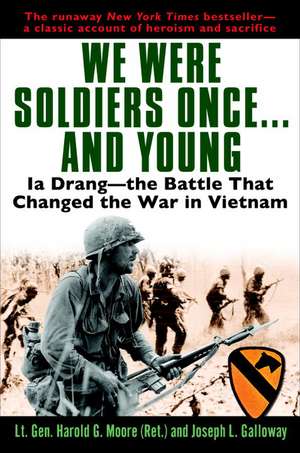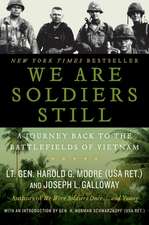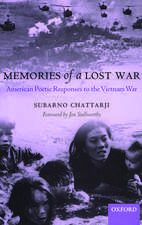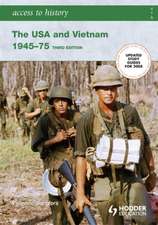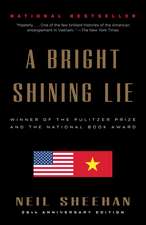We Were Soldiers Once...and Young: Ia Drang - The Battle That Changed the War in Vietnam
Autor Harold G. Moore, Joseph L. Galloway, General Ha Mooreen Limba Engleză Paperback – 31 oct 2004
In November 1965, some 450 men of the 1st Battalion, 7th Cavalry, under the command of Lt. Col. Hal Moore, were dropped by helicopter into a small clearing in the Ia Drang Valley. They were immediately surrounded by 2,000 North Vietnamese soldiers. Three days later, only two and a half miles away, a sister battalion was chopped to pieces. Together, these actions at the landing zones X-Ray and Albany constituted one of the most savage and significant battles of the Vietnam War.
How these men persevered--sacrificed themselves for their comrades and never gave up--makes a vivid portrait of war at its most inspiring and devastating. General Moore and Joseph Galloway, the only journalist on the ground throughout the fighting, have interviewed hundreds of men who fought there, including the North Vietnamese commanders. This devastating account rises above the specific ordeal it chronicles to present a picture of men facing the ultimate challenge, dealing with it in ways they would have found unimaginable only a few hours earlier. It reveals to us, as rarely before, man's most heroic and horrendous endeavor.
From the Hardcover edition.
Preț: 137.56 lei
Nou
Puncte Express: 206
Preț estimativ în valută:
26.33€ • 27.38$ • 22.03£
26.33€ • 27.38$ • 22.03£
Carte disponibilă
Livrare economică 21 februarie-07 martie
Preluare comenzi: 021 569.72.76
Specificații
ISBN-13: 9780345475817
ISBN-10: 034547581X
Pagini: 480
Ilustrații: 16 PG B/W INSERT,ILLUS IN TEXT
Dimensiuni: 155 x 235 x 25 mm
Greutate: 0.63 kg
Ediția:Trade Pbk.
Editura: Presidio Press
ISBN-10: 034547581X
Pagini: 480
Ilustrații: 16 PG B/W INSERT,ILLUS IN TEXT
Dimensiuni: 155 x 235 x 25 mm
Greutate: 0.63 kg
Ediția:Trade Pbk.
Editura: Presidio Press
Recenzii
“A GUT-WRENCHING ACCOUNT OF WHAT WAR IS REALLY ALL ABOUT, which should be ‘must’ reading for all Americans, especially those who have been led to believe that war is some kind of Nintendo game.”
–GENERAL H. NORMAN SCHWARZKOPF
“Hal Moore and Joe Galloway have captured the terror and exhilaration, the comradeship and self-sacrifice, the brutality and compassion that are the dark heart of war.”
–NEIL SHEEHAN, author of A Bright Shining Lie
“A powerful and epic story . . . This is the best account of infantry combat I have ever read, and the most significant book to come out of the Vietnam War.”
–COLONEL DAVID HACKWORTH, author of the bestseller About Face
–GENERAL H. NORMAN SCHWARZKOPF
“Hal Moore and Joe Galloway have captured the terror and exhilaration, the comradeship and self-sacrifice, the brutality and compassion that are the dark heart of war.”
–NEIL SHEEHAN, author of A Bright Shining Lie
“A powerful and epic story . . . This is the best account of infantry combat I have ever read, and the most significant book to come out of the Vietnam War.”
–COLONEL DAVID HACKWORTH, author of the bestseller About Face
Notă biografică
Harold G. Moore was born in Kentucky and is a West Point graduate, a master parachutist, and an Army aviator. He commanded two infantry companies in the Korean War and was a battalion and brigade commander in Vietnam. He retired from the Army in 1977 with thirty-two years' service and then was executive vice president of a Colorado ski resort for four years before founding a computer software company. An avid outdoorsman, Moore and his wife, Julie, divide their time between homes in Auburn, Alabama, and Crested Butte, Colorado.
Joseph L. Galloway is a native Texan. At seventeen he was a reporter on a daily newspaper, at nineteen a bureau chief for United Press International. He spent fifteen years as a foreign and war correspondent based in Japan, Vietnam, Indonesia, India, Singapore, and the Soviet Union. Now a senior writer with U.S. News & World Report, he covered the Gulf War and coauthored Triumph Without Victory: The Unreported History of the Persian Gulf War. Galloway lives with his wife, Theresa, and sons, Lee and Joshua, on a farm in northern Virginia.
From the Hardcover edition.
Joseph L. Galloway is a native Texan. At seventeen he was a reporter on a daily newspaper, at nineteen a bureau chief for United Press International. He spent fifteen years as a foreign and war correspondent based in Japan, Vietnam, Indonesia, India, Singapore, and the Soviet Union. Now a senior writer with U.S. News & World Report, he covered the Gulf War and coauthored Triumph Without Victory: The Unreported History of the Persian Gulf War. Galloway lives with his wife, Theresa, and sons, Lee and Joshua, on a farm in northern Virginia.
From the Hardcover edition.
Extras
Prologue
In thy faint slumbers I by thee have watch'd
And heard thee murmur tales of iron wars...
-Shakespeare, Henry IV, Part One, Act II, Scene 3
This story is about time and memories. The time was 1965, a different kind of year, a watershed year when one era was ending in America and another was beginning. We felt it then, in the many ways our lives changed so suddenly, so dramatically, and looking back on it from a quarter-century gone we are left in no doubt. It was the year America decided to directly intervene in the Byzantine affairs of obscure and distant Vietnam. It was the year we went to war. In the broad, traditional sense, that "we" who went to war was all of us, all Americans, though in truth at that time the larger majority had little knowledge of, less interest in, and no great concern with what was beginning so far away.
So this story is about the smaller, more tightly focused "we" of that sentence: the first American combat troops, who boarded World War II-era troopships, sailed to that little-known place, and fought the first major battle of a conflict that would drag on for ten long years and come as near to destroying America as it did to destroying Vietnam.
The Ia Drang campaign was to the Vietnam War what the terrible Spanish Civil War of the 1930s was to World War II: a dress rehearsal; the place where new tactics, techniques, and weapons were tested, perfected, and validated. In the Ia Drang, both sides claimed victory and both sides drew lessons, some of them dangerously deceptive, which echoed and resonated throughout the decade of bloody fighting and bitter sacrifice that was to come.
This is about what we did, what we saw, what we suffered in a thirty-four-day campaign in the Ia Drang Valley of the Central Highlands of South Vietnam in November 1965, when we were young and confident and patriotic and our countrymen knew little and cared less about our sacrifices.
Another war story, you say? Not exactly, for on the more important levels this is a love story, told in our own words and by our own actions. We were the children of the 1950s and we went where we were sent because we loved our country. We were draftees, most of us, but we were proud of the opportunity to serve that country just as our fathers had served in World War II and our older brothers in Korea. We were members of an elite, experimental combat division trained in the new art of airmobile warfare at the behest of President John F. Kennedy.
Just before we shipped out to Vietnam the Army handed us the colors of the historic 1st Cavalry Division and we all proudly sewed on the big yellow-and-black shoulder patches with the horsehead silhouette. We went to war because our country asked us to go, because our new President, Lyndon B. Johnson, ordered us to go, but more importantly because we saw it as our duty to go. That is one kind of love.
From the Hardcover edition.
In thy faint slumbers I by thee have watch'd
And heard thee murmur tales of iron wars...
-Shakespeare, Henry IV, Part One, Act II, Scene 3
This story is about time and memories. The time was 1965, a different kind of year, a watershed year when one era was ending in America and another was beginning. We felt it then, in the many ways our lives changed so suddenly, so dramatically, and looking back on it from a quarter-century gone we are left in no doubt. It was the year America decided to directly intervene in the Byzantine affairs of obscure and distant Vietnam. It was the year we went to war. In the broad, traditional sense, that "we" who went to war was all of us, all Americans, though in truth at that time the larger majority had little knowledge of, less interest in, and no great concern with what was beginning so far away.
So this story is about the smaller, more tightly focused "we" of that sentence: the first American combat troops, who boarded World War II-era troopships, sailed to that little-known place, and fought the first major battle of a conflict that would drag on for ten long years and come as near to destroying America as it did to destroying Vietnam.
The Ia Drang campaign was to the Vietnam War what the terrible Spanish Civil War of the 1930s was to World War II: a dress rehearsal; the place where new tactics, techniques, and weapons were tested, perfected, and validated. In the Ia Drang, both sides claimed victory and both sides drew lessons, some of them dangerously deceptive, which echoed and resonated throughout the decade of bloody fighting and bitter sacrifice that was to come.
This is about what we did, what we saw, what we suffered in a thirty-four-day campaign in the Ia Drang Valley of the Central Highlands of South Vietnam in November 1965, when we were young and confident and patriotic and our countrymen knew little and cared less about our sacrifices.
Another war story, you say? Not exactly, for on the more important levels this is a love story, told in our own words and by our own actions. We were the children of the 1950s and we went where we were sent because we loved our country. We were draftees, most of us, but we were proud of the opportunity to serve that country just as our fathers had served in World War II and our older brothers in Korea. We were members of an elite, experimental combat division trained in the new art of airmobile warfare at the behest of President John F. Kennedy.
Just before we shipped out to Vietnam the Army handed us the colors of the historic 1st Cavalry Division and we all proudly sewed on the big yellow-and-black shoulder patches with the horsehead silhouette. We went to war because our country asked us to go, because our new President, Lyndon B. Johnson, ordered us to go, but more importantly because we saw it as our duty to go. That is one kind of love.
From the Hardcover edition.
Descriere
This devastating account of the battles against the North Vietnamese at the Ia Drang Valley, November, 1965, rises above the specific ordeal it chronicles to present a picture of men facing the ultimate challenge--and dealing with it in ways they would have found unimaginable only a few hours earlier.
